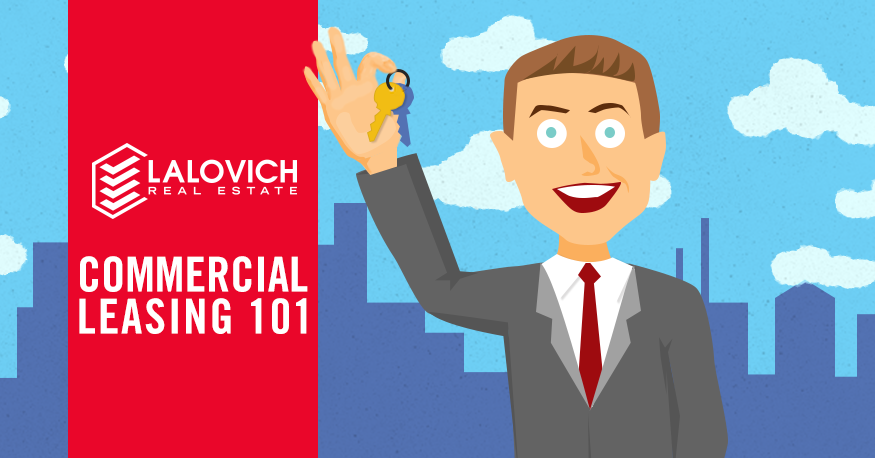Everything You Need To Know Before You Lease Your First Space
Posted on April 30th 2019 by Lalovich
Windsor is known for being dependent on the automotive industry, but with the recent announcement from Chrysler about going back to two shifts, it is becoming more clear to everyone that diversification is essential to continue feeding the growth that Windsor- Essex has experienced in the last 3 years. One of the other major factors that drive this economy are small businesses. We personally get calls everyday from entrepreneurs who have a great idea and a plan to execute, however need help with one of the most important aspects of starting/growing a business; a place to actually run their business! This is why we have put together this step-by-step guide to commercial leasing to make it easier for entrepreneurs to get everything they need to bring their idea to life!
Step 1: Location
Everybody knows location is everything in business, and to be in the right location for YOUR business can make or break new businesses, especially in their first few years. Are you a destination or a walk-in based business? Do you have to be on the 1st floor? What demographics are you trying to target? Do you need to be on a public transportation route? Do you have a complementary business that you would like to be close to? These are just a few of the questions that we ask when finding you that perfect location.
Step 2: Zoning
Every property has a zoning that has a list of specific permitted uses. Before you spend too much time on a location, make sure the zoning permits your business to operate in the space
Step3: Net Lease VS Gross Lease
Net Lease
A Net Lease is typically what we see in commercial real estate; this lease is broken down into net rent, additional rent (operating costs), and utilities. The net rent is basically how much the Landlord’s charging you to use their space, this is the only rate that can be negotiated when leasing. Operating costs are how much it costs the landlord to run the building even if it was empty, this typically includes property taxes, building insurance, common area maintenance, garbage and snow removal, building repairs and maintenance, etc. All of these yearly costs are added up and divided by the total leasable square footage of the building, and the Tenant is responsible for their proportionate share. Typically when you see this type of lease, each unit is responsible for putting utilities in their own name and pay based on usage. The lease rates you see are usually per square foot in the unit, per year. To get your total monthly cost, you must add the net rent and additional rent together, multiply it by the total square footage of the space, and divide that by 12. Utilities are use dependent, but as an example, we typically advise office users to budget $2.50 per square foot per year on utilities. If the lease is “Triple Net” then the Tenant is also responsible for any repairs to major capital items (Plumbing, HVAC, etc) that may be required during the term of the lease. If you are getting into a Triple Net Lease, be sure to have all these items inspected.
Gross Lease
This is typically seen in older buildings and buildings where utilities aren’t separated. This means that the price advertised is your “all in” monthly rent and you have no other costs for leasing the building. However some landlords will still require you to pay for utilities on top of this amount, make sure this is clearly understood before signing the lease.
Step 4: Tenant Improvements
Chances are the space you lease is going to need some renovations to make it suitable for your business, if it doesn’t; this is what we call “Turn Key”. There are many ways to go about Tenant improvements, and it largely depends on the specific situation and preference of the Tenant and the Landlord, and is negotiated before signing. Some of these methods include:
Rent Free Time
The first few months in your new space is rent free so you can spend that money on improvements and you are open for business and making money when your first rent cheque is due.
Tenant Improvement Allowance
If the lease space is in rough shape or needs lots of renovations, sometimes the Landlord will give an improvement allowance so the Tenant can build out the space to their requirements and in exchange will sign a long term lease. The Landlord will reimburse the Tenant the agreed upon amount once renovations are complete and receipts are provided to prove the money has been spent in the unit and all proper permits pulled.
Landlord Build Out
This is where the Landlord will build out the space to the Tenants requirements, and typically in this situation we see Tenants paying higher rental rates so the Landlord can amortize the cost of the improvements over the Term of the lease.
Overall, these are just a few of the things to consider when Leasing a commercial space. Be an informed tenant and your lease transaction should go smoothly. Also consider working with a qualified commercial leasing expert to make sure your interests are protected!
Share: Share on facebook Send it with e-mail Share on twitter Share on linkedin





